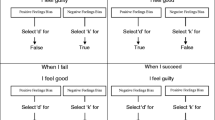Abstract
The current study aimed to test the validity of the Implicit Relational Assessment Procedure (IRAP), as compared to the Implicit Association Test (IAT), by assessing the attitudes of Dublin dwellers and rural dwellers toward Dublin and country life. Discrimination between the two groups for the IAT was marginally significant. The IRAP discriminated significantly between the two groups based on an interaction effect, which showed that rural dwellers had a strong bias toward country life but Dublin dwellers did not show the same bias toward Dublin life. The IRAP data correlated moderately with the explicit measures, but the IAT did not. The findings support the IRAP as a potentially useful measure of implicit attitudes.
Similar content being viewed by others
References
BARNES-HOLMES, D., BARNES-HOLMES, Y., POWER, P., HAYDEN, E., MILNE, R., & STEWART, I. (2006). Do you really know what you believe? Developing the Implicit Relational Assessment Procedure (Irap) as a direct measure of implicit beliefs. The Irish Psychologist, 32, 169–177.
BARNES-HOLMES, D., HAYDEN, E., BARNES-HOLMES, Y., & STEWART, I. (2008). The Implicit Relational Assessment Procedure (Irap) as a response-time and event-related-potentials methodology for testing natural verbal relations: A preliminary study. The Psychological Record, 58, 497–516.
BARNES-HOLMES, D., MURTAGH, L., BARNES-HOLMES, Y., & STEWART, I. (in press). Using the Implicit Association Test and the Implicit Relational Assessment Procedure to measure attitudes toward meat and vegetables in vegetarians and meat-eaters. The Psychological Record.
CULLEN, C., & BARNES-HOLMES, D. (2008). Implicit pride and prejudice: A heterosexual phenomenon? In T. G. Morrison & M. A. Morrison (Eds.), Modern Prejudice (pp. 195–223). New York: Nova Science.
CULLEN, C., BARNES-HOLMES, D., BARNES-HOLMES, Y., & STEWART, I. (in press). The Implicit Relational Assessment Procedure (Irap) and the malleability of ageist attitudes. The Psychological Record.
DASGUPTA, N., & GREENWALD, A. G. (2001). On the malleability of automatic attitudes: Combating automatic prejudice with images of admired and disliked individuals. Journal of Personality and Social Psychology, 81, 800–814.
DE HOUWER, J. (2003). The extrinsic affective Simon task. Experimental Psychology, 50, 77–85.
DE HOUWER, J., & DE BRUYCKER, E. (2007). Implicit attitudes toward meat and vegetables in vegetarians and non-vegetarians. International Journal of Psychology, 42, 158–165.
GKARTZIOS, M., & SCOTT, M. (2005). Countryside, here I come: Urban-rural migration in the Dublin city-region (Planning and Environmental Policy Research Series Working Paper 05/01). Department of Planning and Environmental Policy, University College Dublin.
GREENWALD, A. G., MCGHEE, D. E., & SCHWARTZ, J. L. K. (1998). Measuring individual differences in implicit cognition: The Implicit Association Test. Journal of Personality and Social Psychology, 74, 1464–1480.
GREENWALD, A. G., NOSEK, B. A., & BANAJI, M. R. (2003). Understanding and using the Implicit Association Test: I. An improved scoring algorithm. Journal of Personality and Social Psychology, 85, 2, 197–216.
HAYES, S. C., BARNES-HOLMES, D., & ROCHE, B. (Eds.). (2001). Relational Frame Theory: A post-Skinnerian account of human language and cognition. New York: Plenum.
MCKENNA, I., BARNES-HOLMES, D., BARNES-HOLMES, Y., & STEWART, I. (2007). Testing the fake-ability of the Implicit Relational Assessment Procedure (Irap): The first study. International Journal of Psychology and Psychological Therapy, 7, 253–268.
NOSEK, B., & BANAJI, M. R. (2001). The go/no-go association task. Social Cognition, 19, 625–666.
NOSEK, B. A., GREENWALD, A. G., & BANAJI, M. R. (2006). The Implicit Association Test at age 7: A methodological and conceptual review. In J.A. Bargh (Ed.), Social psychology and the unconscious: The automaticity of higher mental processes (pp. 265–292). Philadelphia: Psychology Press.
O’CONNOR, P. (2005). Local embeddedness in a global world: Young people’s accounts. Young, 13(1), 9–26.
O’HORA, D., BARNES-HOLMES, D., ROCHE, B., & SMEETS, P. M. (2004). Derived relational networks and control by novel instructions: A possible model of generative verbal responding. The Psychological Record, 54, 437–460.
O’HORA, D., PELÁEZ, M., BARNES-HOLMES, D., & AMESTY, L. (2005). Derived relational responding and human language: Evidence from the Wais III. The Psychological Record, 55, 155–174.
O’TOOLE, C., BARNES-HOLMES, D., & SMYTH, S. (2007). A derived transfer of functions and the Implicit Association Test. Journal of the Experimental Analysis of Behavior, 88, 263–283.
STEWART, I., BARNES-HOLMES, D., & ROCHE, B. (2002). Developing an ecologically valid model of analogy using the relational evaluation procedure. Experimental Analysis of Human Behavior Bulletin, 20, 12–16.
STEWART, I., BARNES-HOLMES, D., & ROCHE, B. (2004). A functional analytic model of analogy using the relational evaluation procedure. The Psychological Record, 54, 531–552.
VAHEY, N., BARNES-HOLMES, D., BARNES-HOLMES, Y., & STEWART, I. (in press). A first test of the Implicit Relational Assessment Procedure (Irap) as a measure of self-esteem: Irish prisoner groups and university students. The Psychological Record.
Author information
Authors and Affiliations
Corresponding author
Rights and permissions
About this article
Cite this article
Barnes-Holmes, D., Waldron, D., Barnes-Holmes, Y. et al. Testing the Validity of the Implicit Relational Assessment Procedure and the Implicit Association Test: Measuring Attitudes Toward Dublin and Country Life in Ireland. Psychol Rec 59, 389–406 (2009). https://doi.org/10.1007/BF03395671
Published:
Issue Date:
DOI: https://doi.org/10.1007/BF03395671




